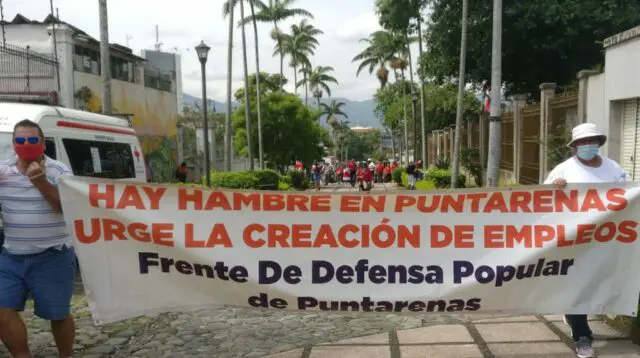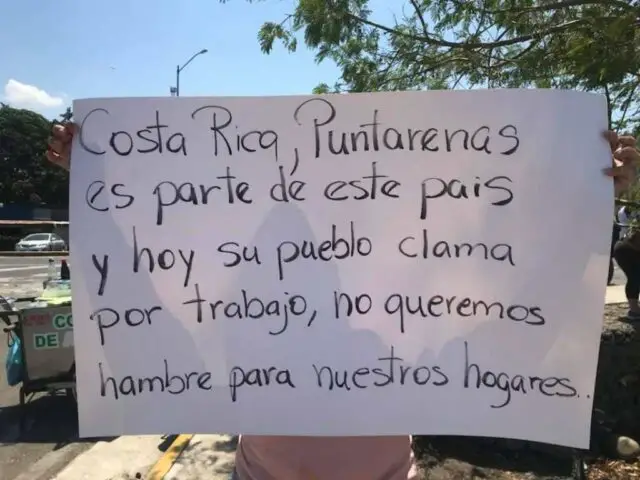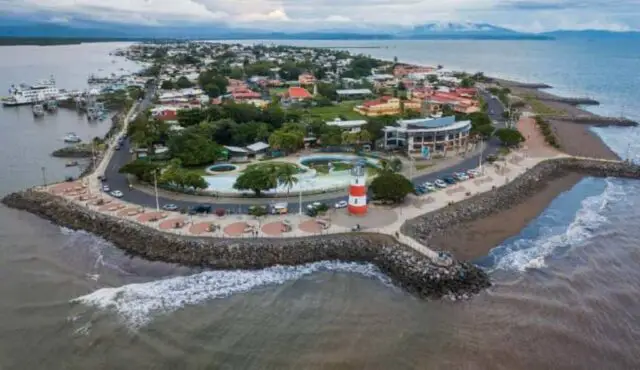At TCRN, we had an exclusive conversation with Dany Villalobos, a member of the Ecological Federation (Fecon) and also a resident and researcher in the Puntarenas region of Costa Rica.
The topic discussed with Villalobos was the poverty of Costa Rica, mainly of Puntarenas. In his opinion, in the country, the trend has been an increase in inequalities for more than 3 decades. Within this increase in inequalities recognized by statistics, there is the phenomenon of localized poverty and Puntarenas is part of one of these impoverished areas in the 21st century.

Analyzing the situation, Villalobos highlighted that in 2019 poverty in the Central Pacific region was already high: it was 8.8% above the country’s average (29.8%> 21%). But in 2020 it increased by 5% more, reaching an estimated 34.7% of poverty: “it is the most impoverished region in Costa Rica today.”
The Central Pacific region is a socio-economic unit that has 93% of the territory in the province of Puntarenas. “Based on this, it can be affirmed that Puntarenas is a territorial conglomerate that is becoming impoverished.”
According to Villalobos’ arguments:
What is happening in these 6 cantons of Puntarenas? What happens in these territories? Statistics only give us numbers. But the geographic analysis allows us to evaluate the scenarios of this reality.

The southern cantons such as Quepos and Parrita are governed by oil palm, which provides many jobs but does not require qualified labor: it therefore encourages a social environment with low schooling, which can be complemented by absence or low state investment in this area.
Garabito concentrates great inequalities:
From the poverty of the fishing families to the enormous capital of the transnational tourism industry that is concentrated in Jacó and Herradura. It is worth denouncing other social scourges associated with the tourism model of “development”: human trafficking, prostitution and drug trafficking, which are also possible thanks to the fact that the State gave space to the boom in the tourist market.
For its part, the privatization of the Costa Rican Pacific Ports Institute (INCOP) in 2006, as part of the state dismantling programs, led to job insecurity and informality of hundreds of families who worked in Caldera and Puntarenas, closing doors to stability, which entails the decentralized participation of the population in public employment activities.
The fishing populations of the Gulf of Nicoya and monocultures such as sugarcane and pineapple are sources of precarious work in the area as well. In urban areas, markets are saturated and there is little capacity to consume while young rural generations migrate to seek other types of opportunities in the cities of the Central Valley.

The opportunities to be employed in stable positions diminish in the zone with the so marked absence of the State. The supposed benefits of the free market are not seen here, but the opposite: damages and economic crisis that encourages the social crisis: there are conditions for illegal activities to take hold that should not exist in our territory.
The structural adjustment that produced the intentional disablement of the National Production Council (CNP), which supported peasant production until the 1980s and the inefficiency of Incopesca to manage fishing activity on the coasts, are signs that state dismantling policies play a role. in favor of impoverishment in this region. They are more than 30 years of neoliberalism, encouraging activities that generate the abandonment of mixed economies and have a hard impact on the social realities of the towns of Puntarenas.
Subsequently, we consulted Villalobos as a researcher and resident of Puntarenas, in addition, a member of Fecon, about some statistical data on the situation of poverty in the area and he informed us, that taking into account the percentages of poverty that he mentioned above, of the household survey of the National Institute of Statistics and Censuses INEC (year 2020).
Urgency
“It is urgent that the State resume its duty and essence of guaranteeing the social rights of the inhabitants of Puntarenas to a dignified life. One in three people has one or more basic deficiencies in the region. The right to work must be strengthened because the Labor exploitation of large companies is unpunished, while informal workers who only struggle to survive in a system that excluded them are persecuted,”said Villalobos.
In this way, it considers that the decent work of the fishermen must be recovered, encouraging fair markets for small-scale fishing that allows many families to distribute the wealth of the sea as a national share, in a sustainable way. A characteristic of Puntarenas is its extensive contact with the sea, these policies would be essential for a fair recovery.
He also added that productive diversification should be encouraged, as well as the recovery of food sovereignty with economic programs aimed at peasant families in social and solidarity economies that help to obtain income from small properties.
Additionally, conditions can be created to produce at low cost and generate local consumption with added values, through linkages that link primary food production with the economies of tourist services, which could give more, improving conditions in the towns. It requires not abandoning public investment and reorienting education, to stop concentrating job expectations on services and revitalize other economic activities.
What are the sectors or communities in Puntarenas that need more attention and in what state are they located?
Villalobos participates in social processes with community leaders from Chomes, Manzanillo and Guacimal, rural districts of Puntarenas, in most of the economic initiatives that advance have had state support such as women’s cooperatives. “We believe that more economic support programs are needed, especially for young people who do not have the conditions to study because they have to attend first, but they do not have an environment of opportunities either. Services are limited in rural areas and migration implies high costs in a country. where in itself it is expensive to live.
Have you talked with any inhabitant about specific cases that you can detail us?
Finally, Villalobos mentioned that he has spoken with people, but they gave him a general idea of what they think, “regions that are in abandonment and where poverty is clearly increasing, state policies of not positive increases on the population create an image refusal of the State that is present to carry the burden of the economy, in the cost of living, but absent to offer economic alternatives that solve the crisis derived from this model of economic dependence on large companies or on the state itself. only state companies, although these could be fundamental in keeping the economy active, at the same time local living conditions are improved and rights are expanded and democratized. We are also talking about incentivizing regional markets and giving technical advice so that they are not only big companies those that monopolize the markets and have their interests on the population”.

